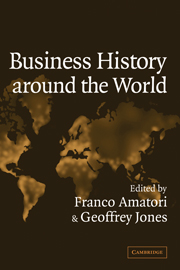Book contents
- Frontmatter
- Contents
- Acknowledgments
- List of Contributors
- Business History around the World
- 1 Introduction
- PART I GENERAL ISSUES, OPEN QUESTIONS, CONTROVERSIES
- 2 Identity and the Boundaries of Business History: An Essay on Consensus and Creativity
- 3 Understanding Innovative Enterprise: Toward the Integration of Economic Theory and Business History
- 4 Productive Alternatives: Flexibility, Governance, and Strategic Choice in Industrial History
- PART II AREA PATTERNS
- PART III COMPARATIVE BUSINESS HISTORY
- Index
- References
3 - Understanding Innovative Enterprise: Toward the Integration of Economic Theory and Business History
Published online by Cambridge University Press: 24 July 2009
- Frontmatter
- Contents
- Acknowledgments
- List of Contributors
- Business History around the World
- 1 Introduction
- PART I GENERAL ISSUES, OPEN QUESTIONS, CONTROVERSIES
- 2 Identity and the Boundaries of Business History: An Essay on Consensus and Creativity
- 3 Understanding Innovative Enterprise: Toward the Integration of Economic Theory and Business History
- 4 Productive Alternatives: Flexibility, Governance, and Strategic Choice in Industrial History
- PART II AREA PATTERNS
- PART III COMPARATIVE BUSINESS HISTORY
- Index
- References
Summary
What determines the growth of an economy? How does a society share among its members the costs of generating economic growth and the benefits that are derived from it? These fundamental questions of growth and distribution are as old as the discipline of economics. But modern economics has not been very successful in providing cogent answers. The main problem is that the conventional theory of the market economy lacks a theory of economic development.
This intellectual deficiency is neither inevitable nor accidental. During the nineteenth century, the elaboration of a theory of economic development was the central project of what came to be called “classical” economics. But during the twentieth century, the economics discipline displayed an ever-growing commitment to the individualistic ideology and ahistorical methodology of “neoclassical” economics. Given these ideological and methodological orientations, adherents to the neoclassical perspective neglected to build a theory of economic development that can comprehend the historical experiences of economic growth and income distribution in the world's most advanced national economies.
Indeed, the neoclassical research agenda by its very definition — the study of the allocation of scarce resources among competing uses — places the process of economic development beyond its analytical scope. Using this definition, conventional economic analysis assumes that, in the determination of economic performance, technological and market conditions can be taken as exogenous.
- Type
- Chapter
- Information
- Business History around the World , pp. 31 - 61Publisher: Cambridge University PressPrint publication year: 2003
References
- 7
- Cited by



